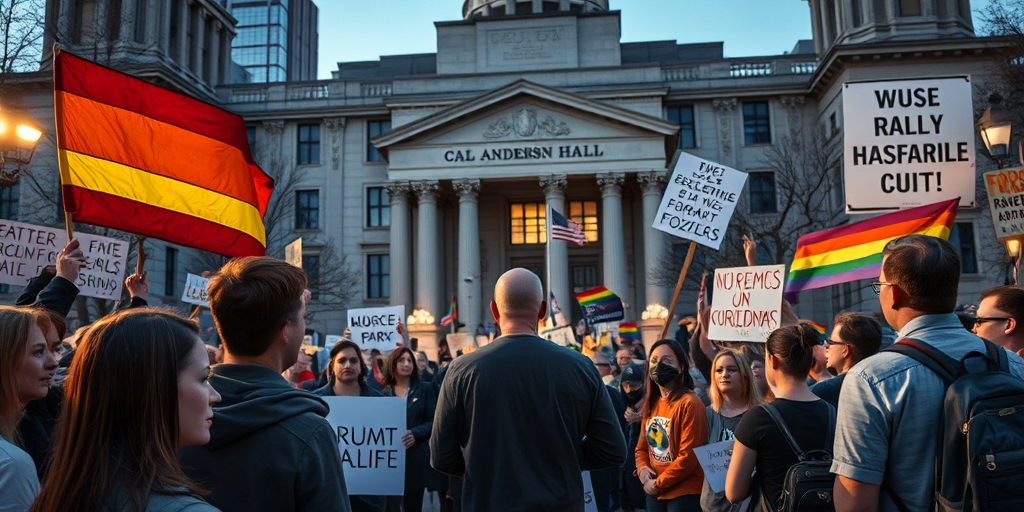After Anti-LGBTQ+ Rally, Seattle Grapples with Response and Future Events
In the wake of a charged gathering by an evangelical Christian group, Mayday USA, Seattle finds itself at a crossroads regarding its approach to managing controversial events in culturally significant spaces. Held in the Capitol Hill neighborhood, a historic haven for the LGBTQ+ community, the May 24 event exhibited the profound tensions inherent in balancing free speech with community values.
Event Fuels Clash and Arrests
On the sunlit Saturday morning of May 24, Cal Anderson Park turned into a battleground of ideologies. Mayday USA, a group known for its staunch anti-trans and anti-abortion stance, organized a rally titled “Don’t Mess With Our Kids,” modeled after initiatives like Peru’s “Con Mis Hijos No Te Metas.” The choice of Cal Anderson Park, named after Washington State’s first openly gay legislator, sparked outrage among residents and amplified community interest.
In response, activists from various backgrounds gathered under the banner “Keep Your Bibles Off Our Bodies.” The Seattle Police Department (SPD) reported that counterprotesters threw objects, leading to 23 arrests, but community members alleged the police’s aggressive tactics exacerbated tensions.
Mayor Bruce Harrell was quick to voice his concerns about Mayday USA bringing disruption to what is deemed sacred ground by Seattle’s LGBTQ+ residents. “Today’s rally was meant to provoke in the heart of our most prominent LGBTQ+ neighborhood, presenting beliefs fundamentally opposed to our inclusive city values,” he declared.
Repercussions and Political Response
The controversy did not end there. In response to the Mayor’s condemnation, Mayday USA orchestrated a second rally, “Rattle in Seattle,” at City Hall on May 27, which saw further protest and additional arrests. The event underscored the persistent divide between the city’s commitment to inclusivity and its legal obligation to uphold constitutional free speech rights.
Councilmember Alexis Mercedes Rinck took a firm stand against Mayday USA, labeling them as “far-right, anti-trans extremists.” She called for a thorough investigation into both the permitting process that allowed the event and the SPD’s handling of the situation. Rinck stated: “While I respect free speech, it’s vital to recognize the harm when hate-filled events threaten the safety and spirit of our community.”
Balancing Free Speech and Safety
Seattle’s challenge lies in navigating the nuances of First Amendment rights while ensuring public safety. The city’s current permitting regulations do not allow for event restrictions based on content, emphasizing that such conditions must be viewpoint-neutral. However, discussions are emerging on how to potentially implement “time, place, and manner” restrictions without infringing upon fundamental freedoms.
Erin Carr, a legal expert, highlighted the complexities involved: “The First Amendment holds significant weight, yet does not obligate cities to permit scenarios that might compromise public safety. It’s about fine-tuning regulations to ensure free expression can coexist with community welfare.”
Looking Ahead: Community and Policy Implications
The potential relocation of similar future events from Cal Anderson Park has gained traction among community advocates. A petition led by former Gender Justice League co-director Elayne Wylie is pushing city officials to consider alternative locations that mitigate conflict risk while accommodating free speech.
As a next step, Seattle’s administration, including the Parks Department, may review how events are evaluated and approved. Mayor Harrell advocated for leveraging current permits while anticipating the impact on community harmony.
Seattle cannot afford to ignore the broader implications of these events. This situation reflects ongoing challenges and conversations about reconciling free speech with the sanctity of valued public spaces. Engaging local stakeholders in these discussions is crucial for shaping policies that honor both individual rights and collective principles.
Resources for Residents
Residents seeking to engage in dialogue about these policy changes can access resources via the Seattle City Council’s website or participate in public forums scheduled throughout the summer. Community groups are also organizing workshops to educate residents on their rights and the permitting process for public events.
Seattle’s community fabric remains resilient, bound by a steadfast commitment to inclusivity and respect for diverse voices. The current challenges may serve as a catalyst for shaping a future where vibrant discourse flourishes without compromising community safety or values.
For more in-depth stories and discussions about Seattle’s evolving landscape, stay connected with Woke News and support our commitment to independent, local journalism.







